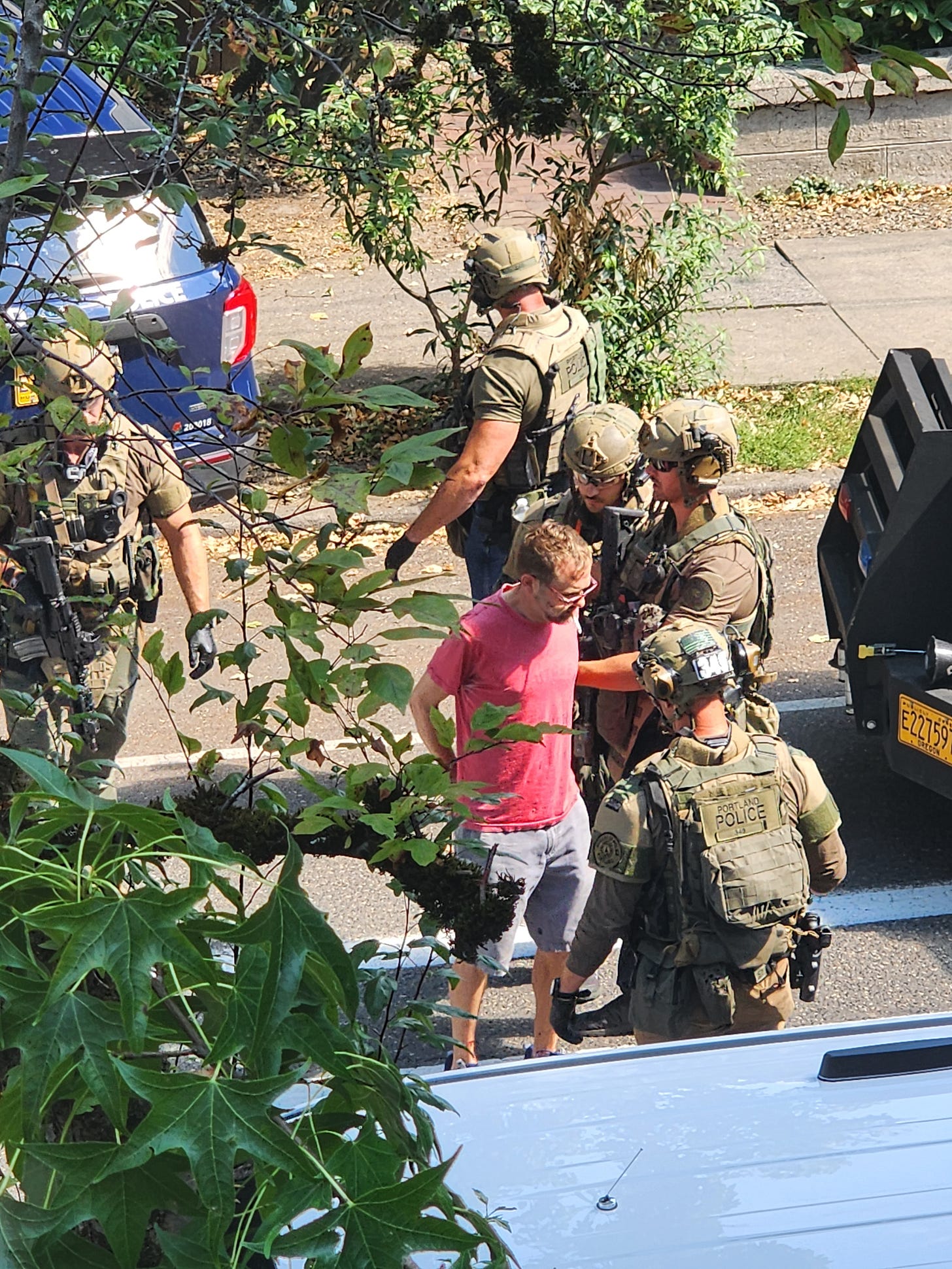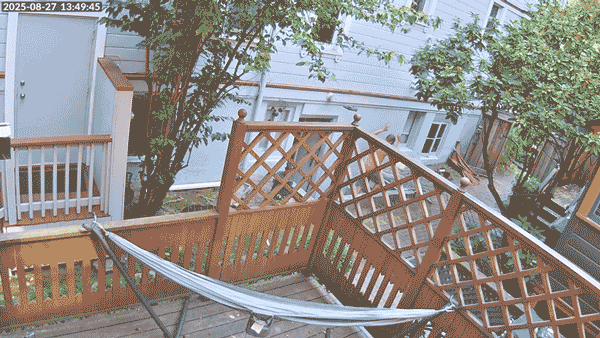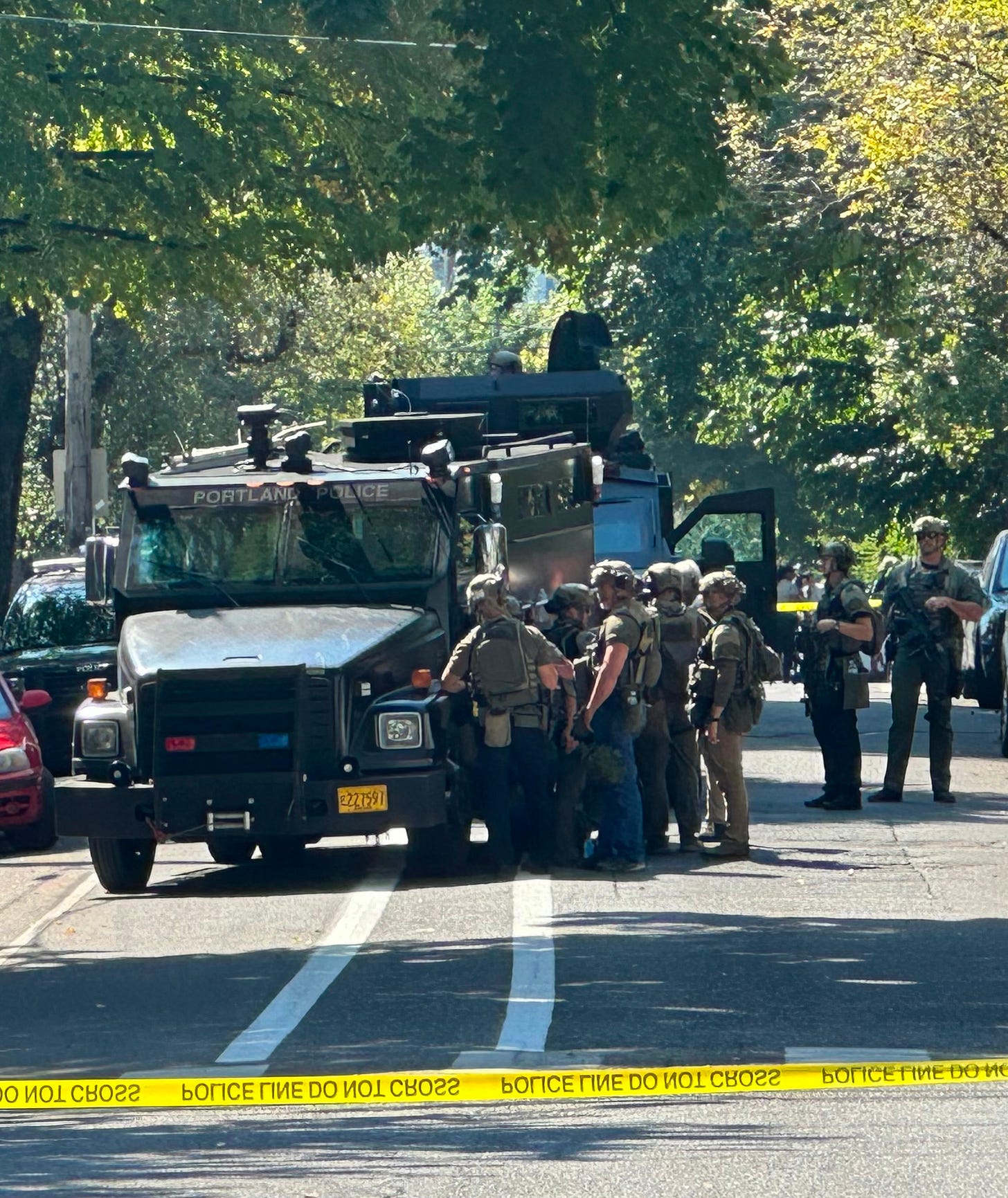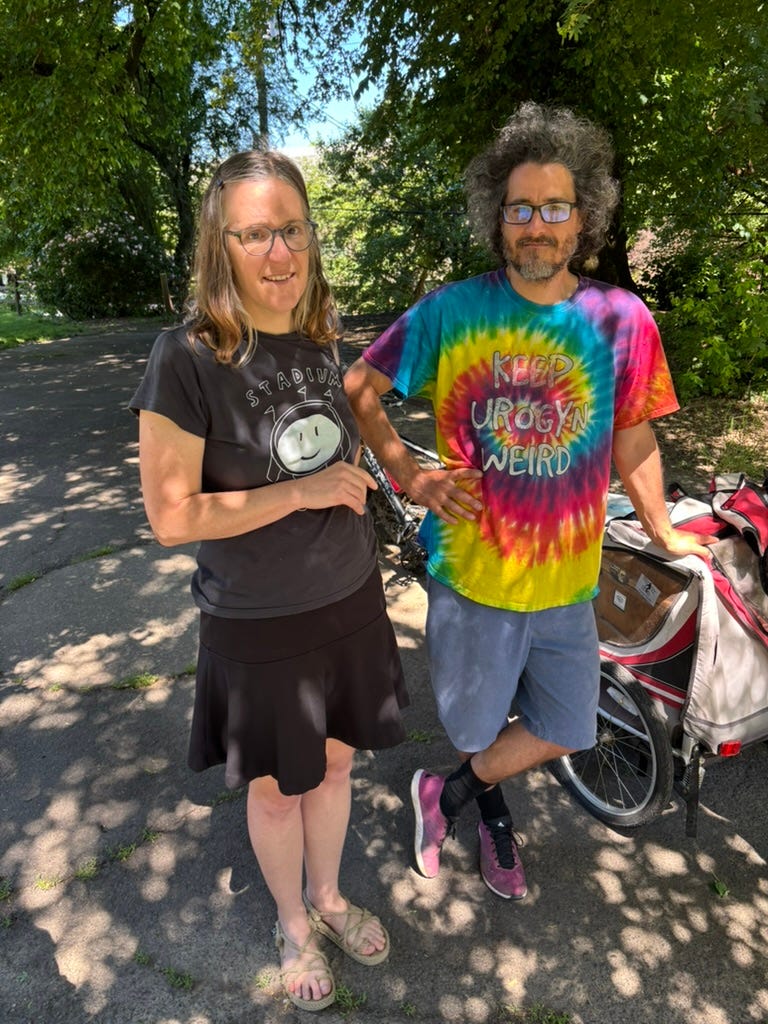Overlapping crises converge in a NW Portland stabbing
Suspect had violent history and should have been detained before incident

In late August, a man with a large knife emerged from his basement apartment near Couch Park and attacked two people who had been moving a tent on the sidewalk along Northwest 18th Avenue. To most, it seemed to be an unprovoked act of violence.
But to neighbors, it did not come out of nowhere. It rose from the collision of overlapping pressures: unsheltered homelessness spilling into public space, a drug addiction epidemic and violent repeat offenders evading consequences. These factors have converged around Rose Haven women’s shelter at Northwest 18th and Glisan streets.
The attack, neighbors said later, felt like a breaking point—the kind of event all fear but few expect to unfold on their own block.
Nearly everyone in the neighborhood has heard the story by now. Ask around at a corner store, in the park or over a drink, and people recall it instantly. Before the violence, Victor Palmer-Regen wasn’t anonymous. He was known to some neighbors for his short fuse and constant presence smoking cigarettes on the curb at 18th and Hoyt.
“You’d see him at all hours,” one resident said. “He wasn’t threatening, but he could flip fast.”
Kyle Lookreddy saw him early that morning. “He was sitting on the curb smoking, playing on his phone, totally normal, lighthearted,” Lookreddy recalled. “We talked for a minute … He even joked with me.”
A few hours later, Lookreddy would recognize him as the suspect at the center of a police standoff.
By late morning, police responded to reports of a stabbing near 18th and Johnson, two blocks north of Palmer-Regen’s apartment. Investigators said two people were injured while moving a tent on the sidewalk. Both victims survived, though the man was seriously injured.

Missed opportunity
Palmer-Regen was known to neighbors for an uneasy mix of charm and volatility. Court records show Palmer-Regen had two misdemeanor assault convictions from 2023, a felony DUII that same year and a pending assault charge from April 2025. He was serving probation when he missed a hearing in August, prompting a warrant for his arrest on Aug. 25, two days before the attack. That open warrant, paired with his probation violation, should have been enough to detain him, but no action was taken.

Standoff
After the attack, Palmer-Regen retreated to his apartment. Within minutes, police surrounded the building and ordered residents to stay indoors. The confrontation lasted for four hours as heavy armored vehicles, canine officers and the Portland Police Bureau’s Special Emergency Reaction Team were deployed.
Security footage provided by a neighbor captures the tense sequence of events. A police robot descended the narrow basement stairwell and reportedly detonated a charge that blew open the red front door—an explosion that shook nearby windows.
Afterward, Palmer-Regen can be seen pacing and shouting from inside the apartment. A police drone hovers over the walkway while officers position themselves near the gate of the fence surrounding the property.
At one point, Palmer-Regen emerges from the doorway holding a cigarette. Startled by an officer stationed on a neighboring patio with a rifle trained on him, he raises his hands briefly before retreating. From inside, he yells, “You exploded my door!” and hurls profanities, extending his middle finger.
After tossing the spent gas canister and continuing to argue from the stairwell, he eventually surrenders. He exits slowly, arms spread, telling the officer, “Shoot me, bitch.” Then, cigarette in mouth, he walks out onto 18th Avenue and is taken into custody without further incident.
Charges filed
Prosecutors charged Palmer-Regen with two counts of second-degree assault, two counts of unlawful use of a weapon, one count of unlawful use of mace and first-degree criminal mischief. Citing Palmer-Regan’s violent history and repeated probation violations, the Multnomah County District Attorney’s Office sought preventive detention under ORS 135.240(4). A judge agreed, ordering him held without bail pending trial.
The same record that now justified keeping him in custody—his prior assaults, missed hearings and open warrant—had not been enough to detain him before the stabbing. Palmer-Regen remains in custody at the Multnomah County Justice Center. His next court appearance is scheduled for December.
Cracks in probation system
State and local officials warn that Oregon’s parole and probation systems are overstretched. A report from Oregon Public Broadcasting published just nine days before the stabbing noted that community corrections departments across the state were facing a $60 million budget shortfall, jeopardizing the supervision of about 22,000 people recently released from custody. In response, counties planned to cut staffing and scale back access to housing and treatment support.
Officials said the crisis had already begun to force hard choices: triaging resources toward the most high-risk cases and reducing oversight for others. Routine supervision, once a central part of preventing escalation, has become harder to enforce. Many violations such as missed check-ins, skipped restitution payments or failed drug screenings go unaddressed.
That’s what happened with Palmer-Regen, who remained in the community unsupervised.
Neighborhood responds
As official order has broken down, neighbors have banded together to do what they can. Friends of Couch Park meets weekly, standing in a circle in the park and discussing whatever topic seems most pertinent. Meetings include updates on city policy, park improvements and safety coordination with local schools.
The group hosts park cleanups and family-friendly events designed to keep the space active and welcoming. It was founded in 2023, when the park’s eastern edge was overrun with tents and open drug use. Parents walking their children to school reported encountering people smoking fentanyl on benches.
“This is a school,” group President Kara Shane Colley recalled thinking. “This is not acceptable.”
Within weeks, neighbors started gathering every Friday—not to chase anyone away, but to show that people still care about the park.
“We’re here to bring it to life,” Colley said.
They began by walking the grounds, picking up trash and introducing themselves to others in the neighborhood. They learned to report camps through the city’s 311 system and established direct contact with park rangers. They also started organizing small events—free cocoa, board games, community art projects—to attract families back.
“If kids are here, it feels safe again,” one member said. “That’s the point.”
Their approach is deliberate: Maintain compassion, but insist on boundaries.
“I think I was afraid to say, ‘You can’t do your drugs here,’ because then someone would say, ‘Oh, she’s anti-homeless,’” Colley said. “But children deserve a voice, too.”

Holding space with compassion
Friends of Couch Park members see their role as a bridge between services and safety—recognizing that compassion and enforcement are not opposites.
“We can hold complex thoughts in our heads,” Colley said. “We can care about people struggling with homelessness and addiction, and also care about our kids and our park.”
The group has cultivated relationships with Portland Parks & Recreation, the mayor’s office and the Portland Police Bureau.
The group also works closely with the Metropolitan Learning Center and nearby congregations on beautification and mural projects. They’ve coordinated graffiti removal and are exploring art installations on fences that were once tagged.
If the criminal justice system allowed one resident’s instability to escalate into a SERT team emergency, neighbors have built a system of early social, nonpunitive resilience.
“If you’re present every week, you can notice when things start to go wrong,” Colley said. “We’re just neighbors, but sometimes that’s what makes the difference.”
“It’s all the small things that make the neighborhood better,” Friends of Couch Park member Max Steele said. “We just don’t give up.”




Thank you for this article showing what neighbors can do when they work together.
What is missing from the article is what is sentence was for each of his previous convictions, whether he was jailed, or imprisoned for them, and information of the circumstances of each of his previous convictions. Proper punishment for violations of the law should be the first thing we look at when evaluating recidivism and whether society is upholding its commitment to public safety.